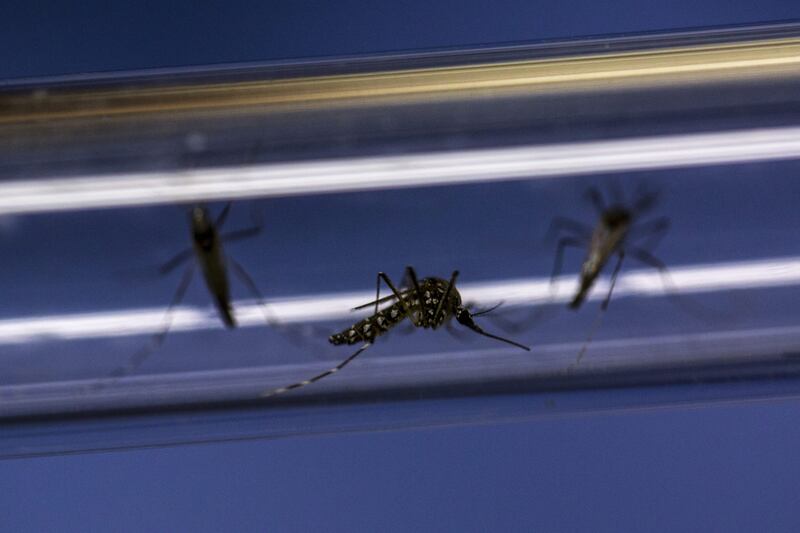They're male, they're Aedes and they don't bite.
Singapore will be releasing an army of bacteria-infected mosquitoes on Tuesday in a bid to suppress the Aedes aegypti mosquito population as the country battles with an outbreak of Zika.
The World Health Organisation warned last week that the mosquito-borne virus, already found in 70 countries including Singapore, will "highly likely" spread further in the Asia-Pacific region.
Thousands of male Aedes aegypti mosquitoes carrying the Wolbachia bacteria, which is harmless to humans, will be released regularly into streets, stairwells and open areas in three areas of Singapore as part of a six-month field study.
Their target is the female Aedes aegypti, the primary carrier of viruses such as Zika, dengue, chikungunya, and yellow fever.
Research shows that when male mosquitoes carrying Wolbachia mate with female mosquitoes that do not have the bacteria, their eggs do not hatch.
"Multiple releases of male Wolbachia-carrying Aedes aegypti mosquitoes over time will thus eventually lead to a reduced urban Aedes aegypti population," said Singapore's National Environmental Agency when announcing the field study.
"If successful, this will complement our existing mosquito control efforts and eventually lead to the suppression of the Aedes aegypti mosquito population and a possible curtailment of dengue or Zika transmission," Singapore's minister for the environment and water resources, Masagos Zulkifli, told parliament in September.
Singapore reported its first locally transmitted Zika case on August 27, and more than 400 have been detected since, though most patients have recovered. Other South-East Asian countries with Zika include Thailand, the Philippines, Malaysia and Vietnam.
While the symptoms for Zika are fairly mild, it could be dangerous for pregnant women as it has been linked to microcephaly - a severe birth defect where babies are born with abnormally small heads.
As male mosquitoes feed only on nectar from plants, they neither bite nor transmit diseases.
To prove the point, the environmental agency has been inviting residents of the selected districts to visit its mosquito-breeding facility. There, according to the Straits Times newspaper, residents can enter a cage where male mosquitoes are flying freely yet not get bitten.
Wolbachia has been recommended by the World Health Organisation as a "promising" tool to reduce mosquito populations and prevent the transmission of Zika.
Singapore's approach differs from that of the Eliminate Dengue programme, which releases both male and female mosquitoes infected with Wolbachia into the environment.
When males with Wolbachia mate with females that also have the bacteria, the eggs will still hatch but will contain Wolbachia - a naturally occurring bacteria found in 60 per cent of insects such as butterflies, moths, dragonflies and fruit flies.
"This allows Wolbachia to invade the mosquito population and once invaded, the mosquitoes no longer are capable of transmitting dengue or Zika," said Prof Scott O'Neill, director of the Institute of Vector Borne Disease at Australia's Monash University, who has been working with the bacteria for more than 25 years and leads the team of international researchers at Eliminate Dengue.
"We believe that the Wolbachia approach that we are using has the potential to dramatically reduce the burden of these diseases," he told The National.
Eliminate Dengue, which pioneered the use of Wolbachia to stop mosquitoes from transmitting viruses, has successfully introduced the bacteria into Aedes aegypti populations in Australia, Brazil, Colombia, Indonesia and Vietnam since 2011.
"The Singapore approach is about trying to reduce the mosquito population. Our approach is about not trying to kill the mosquito but just stop it from transmitting disease to people," Prof O'Neill said.
"I think the Singapore approach can succeed to reduce the mosquito population but no one has been able to show yet that they can reduce the mosquito population to zero using this approach - so releases will likely need to continue indefinitely to obtain control."
Set in the tropics, where 5.6 million people live on an island slightly larger than 700 square kilometres, Singapore's humidity and high density population make it a conducive breeding ground for the Aedes mosquito. The extremely resilient species - described by the UN as an "opportunistic and tenacious menace" - require as little as a drop of water to hatch, and can breed almost anywhere: in flower pot trays, discarded bottle caps and old tyres.
Even before Zika was reported in Singapore, the country was on a years-long campaign to eradicate the Aedes aegypti mosquito, which is primarily responsible for thousands of dengue cases each year.
In February, the environment agency cautioned that unless immediate measures were taken to suppress the Aedes mosquito population, dengue cases this year could exceed 30,000 - higher than the record 22,170 cases in 2013.
The agency's Environmental Health Institute has been researching different mosquito control methods for the past six years, focusing on Wolbachia in the last four years.
"We are not embarking on this lightly," Mr Zulkifli, the environment minister, told parliament. "We have studied this for years and have taken all steps to ensure public health and safety will not be compromised."
"That said," he added, "the Wolbachia technology is not a silver bullet and will take some years before we can deploy it in scale."
jtan@thenational.ae
In fight against Zika, Singapore releases more mosquitoes
Thousands of male Aedes aegypti mosquitoes carrying the Wolbachia bacteria will be released regularly into streets, stairwells and open areas in three areas of Singapore as part of a six-month field study.

Editor's picks
More from the national




